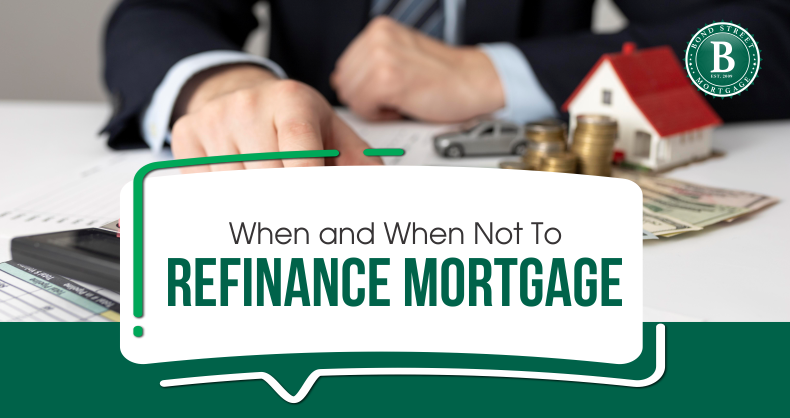
Are you planning to swap your old home loan for a new one?
The decision to refinance your mortgage is one of the vital financial choices you can make that can have long-standing effects on your financial well-being. While many people refinance their mortgages to get benefits like lower interest rates, cash out equity, or convert from a variable interest rate to a fixed one, the decision cannot always be considered best.
In this blog, we will help you understand when to and when not to refinance your mortgage so that you can get an idea of whether it is the best course of action for you.
When To Refinance Your Mortgage?
Take a look at some of the cases when refinancing your mortgage is ideal for you:
1. Avail Lower Interest Rates
If there is a drop in the market interest rates, you can grab lower interest rates by refinancing your mortgage, resulting in lower monthly payments and lower total interest payments.
A general rule of thumb says that you are in benefit if you can reduce your interest rates by 2% through refinancing. However, many lenders believe that a 1% savings is also a good incentive for borrowers.
2. Get a Shorter Term
When the interest rates fall, you can reduce your total loan term by refinancing your existing loan for a new one. At times, this change will not make much difference to your monthly payments, but you will be free from the headache of a loan sooner than anticipated.
For example: A 30-year fixed-rate mortgage on a $2,00,000 loan is 4.5%. When you refinance your mortgage from 4.5% to 3.5% for a new loan term of 15 years, there will only be a slight increase in the monthly payment from $1,013 to $1,033.
This change in terms would save you money in interest payments over the life of the loan and allow you to pay off your mortgage faster.
3. Switch from ARM to Fixed-Rate or Vice-Versa
Most adjustable-rate mortgages start at lower interest rates, which rise periodically. Due to this, the interest rates can sometimes be higher than that of a fixed-rate mortgage. If this is the situation with your current loan, refinancing is suitable for you as you can reduce the risks of future hikes with a fixed-rate mortgage.
On the other hand, if the interest rates are declining, converting from a fixed-rate mortgage to an ARM can be beneficial as you can get lower interest rates. This is a practical option for homeowners who don’t wish to stay in their current home for a long period of time.
4. Eliminate PMI
If you bought your home with a down payment of less than 20%, you are required to pay PMI (Private Mortgage Insurance). As your home’s value appreciates and you pay down your mortgage, you may reach the 20% equity threshold, allowing you to remove PMI. Refinancing your mortgage can help you get rid of this extra monthly expense.
When Not To Refinance Your Mortgage
Take a look at some of the cases when refinancing your mortgage is not ideal for you:
1. Unaffordable Closing Costs
Refinancing your existing mortgage does not come for free. It typically involves closing costs that can add up to several thousand. It is important that you consider all the costs with closing, like processing fees, underwriting fees, and application fees.
Consider all these costs and see if you are in a position to pay so much money right now. If you require that money for other critical matters, it is best to avoid refinancing your mortgage at the moment.
2.Poor Credit Score
Refinancing can make sense only when your credit score has improved. Generally, a credit score of more than 760 is required to get you the best interest rates. If your credit score has remained stable or gone down since you got your existing mortgage, you will not be able to avail the benefits of refinancing.
At this point, it is best to evaluate your credit score and take steps to improve it further so that you have a chance to get a loan with favorable terms.
3.More Long-Term Costs
The ultimate goal of refinancing your mortgage is to save money. But let us tell you, that is not always the case. If you have been paying towards your mortgage for a good duration now, you may have paid more in interest than principal.
If you refinance your loan over a longer time period for lower interest rates, there is a greater chance that you will be paying the interest rates twice. If you go for shorter periods, your interest rates will rise, and so will your monthly payments. While this might be affordable currently, you need to assess whether you can carry the burden of increased payments long-term.
Conclusion
Whether you choose to refinance your mortgage or not, carefully considering your finances is the key to making a financially sound decision. Evaluate your goals and the prevailing market conditions before finalizing anything.
At Bond Street Mortgage, we help you find the perfect loan if you want to refinance your mortgage. Our user-friendly loan finder will take relevant details from you and provide options with the lowest monthly payments and interest rates. For more assistance, contact our professionals to receive the highest level of mortgage services.












